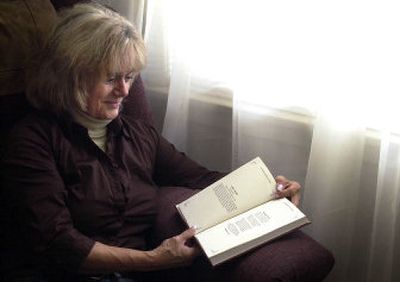Bus driver’s story enters new chapter

No one’s life can be captured in one news story. Maryann Ferry’s is no different.
Exit 289 profiled Maryann roughly a year ago. We were looking for a seasoned bus driver, someone who shuttled kids back and forth to school from kindergarten through high school, essentially watching the community’s children develop through a rearview mirror. Maryann, who had been driving buses for 24 years in Freeman, delivered.
She’d given her riders an assignment a couple years earlier to calculate how many miles they traveled on the bus in one year and just how far they would get if they headed across country. The answer was 5,400 miles.
“Now,” Maryann said. “You can go all the way to Florida and part of the way back on what we travel in one year. That’s how you get to know these kids so well.”
After that story, after Maryann pulled the bus into the bus barn and drove home to Spokane Valley in her 7-year-old Chrysler Concord, her own journey became unbearably difficult.
Her husband, Don Ferry, fell ill. Maryann and her husband didn’t think it was anything big. The day before, she’d fixed him a tuna fish sandwich and she speculated that was what ailed him. You always look for the things you know and not the things you don’t in a time like this. What did Don Ferry eat that his wife hadn’t? Who had he been hanging around? Maryann’s husband wasn’t about to run a marathon, but he wasn’t unhealthy, either.
The doctor told the Ferrys that Don had liver cancer, and had for some time. That was in February. By April 1, Don Ferry was dead.
For the first time in her life, Maryann Ferry, 53, was alone. She’d married Don straight out of high school in Santa Rosa, Calif. She was 18. He was 20, which by California law meant Don needed a permission slip from his parents so he could marry his sweetheart.
To Maryann, Don was a big guy; he was 6 foot 1. She was a foot shorter. They were introduced as teenagers, but as it turned out very early on in life he’d once protected her, ordering some bullies, who had picked her up and were carrying her off, to put her down.
Don’s motto was “bigger is better and Maryann is the only exception to that rule.” Even on his deathbed, he was figuring out how to protect Maryann. Drawing his children in close for private conversations about their mother, Don ordered his son, Brian, to help Maryann “at all costs,” even if it meant quitting his job in Seattle on a second’s notice and moving back to Spokane. He told his daughter, Cheryl, to stay close to home at least until she was married. Cheryl was to be married in August.
To balance things out, he told Maryann to leave the kids alone, to let them live their lives unless she absolutely needed them.
One month after Don died, Maryann needed somebody. It was Mother’s Day. She was driving home alone from Seattle where she’d spent the weekend visiting Brian. The radio was off and she was very aware of being the only one in the car as she cut across the barren solitude of Central Washington. Her thoughts turned to Don and soon she was working on a poem:
Because of you, I know how to fall.
Because of you, I know how to stand
Because of you, I know how to love.
Because of you, I can love again.
Because of you, I know how to be strong.
Because of you, I know how to trust.
Because of you, I can find my way.
Because of you, I can love again.
Because of you, I can laugh ‘til it hurts.
Because of you, I can cry ‘til I burst.
Because of you, I can do it all.
Because of you, I can have a ball.
Because of you, I can do anything.
Because of you, I can love again.
Because of you, I can take a trip.
Because of you, I can learn from the pain.
Because of you, I can know God’s plan.
Because of you, I can.
She put the poem on paper when she got home. The following Monday she was sharing it with friends, who suggested she submit it to the International Library of Poetry, which awards cash prizes for poems at its twice annual conventions in Washington, D.C.
Maryann sent off the poem not expecting much. She had other things on her mind. Don’s mother died not long after he did. Cheryl’s wedding was a couple months away.
And, there was a problem with Maryann’s bus route; it went right by the house where she and Don started their family. Every time Maryann drove it, she cried.
But every couple weeks, a letter would come in the mail congratulating Maryann on her poem passing another editor’s cut, while cautioning that there were thousands of entries. She’d tuck the letters away and carry on with her life. Cheryl Ferry became Cheryl Thompson. The grandfather of the bride gave her away. Maryann collected her husband’s ashes and scattered them on an Oregon hillside believed to be the site of buried treasure.
Then she got her final letter from the poetry contest. She placed 33rd among all those poets, good enough for a trip to Washington, D.C., and a trophy big enough to make Jell-O salad in.
“My mom used to say, If God brings you to it, he’ll pull you through it,” Ferry said last week.
She was sitting at a Safeway coffee bar in Hillyard, on a break from her bus job. The Freeman School district had called and offered her a different route, one that sent her into Spokane once a week instead of by her old house.
And the wheels on the bus go round and round.